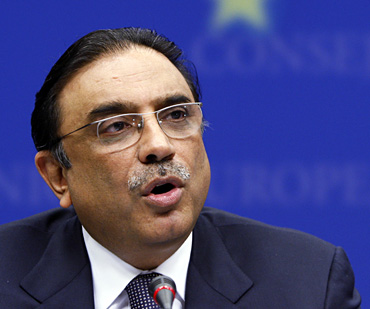 All indications are that elections in Pakistan will now be held in May 2013. If this schedule is adhered to, then it will be the last day of the present government, says Vikram Sood.
All indications are that elections in Pakistan will now be held in May 2013. If this schedule is adhered to, then it will be the last day of the present government, says Vikram Sood.
A caretaker government would have to be put into place the precise dates for this would have to be worked out. Lobbying for this has already begun.
Pakistan today has a hyperactive judiciary led by supreme court Chief Justice Iftikhar Mohammed Chaudhry, a beleaguered government of Asif Zardari as it tries to stave off a rampaging judiciary, political parties at loggerheads with each other, an army headquarter irritated by judicial activism, and the media enjoying this and even manufacturing many of the conspiracy theories doing the rounds.
The main achievement of the present government has been that it becomes the first government to complete its five-year-term despite all its instabilities.
Political manoeuvres
Earlier, there were rumours that the government may seek postponement of elections because of the law and order situation with Karachi being an cauldron of violence of different hues -- sectarian, political, ethnic and crime -- and sometimes all mixed together.
Balochistan is seemingly out of control and the Federally Administered Tribal Areas are simply out of bounds, as sectarian Sunni gangs have roamed the streets of Punjab, singling out Shia mourners during and before Moharram. Corruption and a badly faltering economy have added to the troubles.
The army has been quite content, for its own reasons of self-preservation, to sit back, stay away from hot spots like FATA and let the government continue to seem and remain ineffective.
There has been a problem about delimitation of constituencies in Karachi. The Supreme Court was looking at complaints by Pakistan Muslim League-Nawaz and the Pakistan Tehreek-e-Insaf that the Muttahida Quami Movement had manipulated certain constituencies in Karachi.
The usual alignments have also begun with bit-players the PML-Q announcing an electoral alliance for seat adjustments with the Sunni Ittehad Council, which is opposed to a secular state. The Awami National Party seeks an electoral alliance with Jamiat Ulema-e-Islam-Fazl in Khyber Pakhtoonkhwa.
Another hopeful to have joined politics is the father of Pakistan's nuclear bomb. Abdul Qadeer Khan's party, the Tehreek-e-Tahafuzz Pakistan, whose acronym in English is TTP or Save Pakistan Movement was among the 19 new parties registered to contest the 2013 elections.
But these are side issues; the main battle will be between the Pakistan People's Party and the PML-N, with the army as the ultimate arbiter.
As the political parties scurry for cover and readjustments, Zardari is understood to have offered his former estranged Prime Minister Yusuf Raza Gilani a sop, by appointing his son into the federal cabinet which was declined. Apparently, the two are manoeuvring for space within the PPP ahead of the elections.
Pakistan's main political parties remain close knit elite groups, even families where induction of fresh blood is frowned upon. In addition, they also have acquired secret militant wings said to be equipped with lethal weapons, storm troopers, and even assassins to settle scores or simply as alternative methods of argument and control.
Essentially the battle is between Zardari and Chief Justice Iftikhar Chaudhry. The former lost one running battle when in September this year, Prime Minister Raja Pervez Ashraf wrote the letter to the Swiss courts in the money laundering case; something that his predecessor, Yusuf Gilani had refused to do.
Judicial activism having won after a two-year effort, has now reason for continued activism.
The Lahore high court has been hearing two petitions against Zardari. One petition seeks that the Zardari should cease to be either the PPP co-chair or the president of Pakistan. The second petition emanates from the famous October 19 order regarding the Asghar Khan-Inter-Services-Intelligence case.
The petitioner claims President Zardari is in contempt of court for continuing to politicise the presidency in violation of the judgment, which says that the president has to be apolitical.
Zardari's problem is that he cannot leave the PPP in the hands of the inexperienced Bilawal Bhutto and, typical of all such parties, there is no other heir apparent. He obviously cannot quit the presidency as this would mean an end to his immunity from prosecution.
The only choice he has is to battle it out on legalities but as The Friday Times editor-in-chief Najam Sethi says in his column, this only means more instability and uncertainty.
A sign of the times was when Zardari refused to accept the recommendations of the Judicial Commission of Pakistan for three judicial appointments to the Islamabad high court and instead referred it back to the JCP for reconsideration.
This battle could become truly adversarial as the supreme court has since admitted a petition challenging the presidential decision to refer the recommendation back to the JCP.
The Zardari government has other questions to answer: the supreme court issued notices on November 27 to Intelligence Bureau former heads Masood Sharif Khattak and Tariq Lodhi to provide details of an alleged transfer of Rs 270 million from IB's funds to be spent by PPP for electoral purposes.
Inevitably, the PML-N has filed a petition in the supreme court, alleging misuse of funds.
This is not the end of the story. The other battle is between the army and the judiciary. The October 19 decision of the SC embarrassed and annoyed the army considerably. Chief Justice Iftikhar Chaudhry announced that the 1990 elections had been rigged against PPP through illegal funding.
The then President Ghulam Ishaq Khan, the Army chief General Aslam Beg, and DG MI Gen Assad Durrani, were the architects of this intrigue. Naturally all of Pakistan was left virtually breathless, some anticipating the worst -- a military take over.
Media overdrive
The media and gossip mill went into overdrive. Some speculated that the army and the supreme court would bless a technocrat government with a mandate limited in time and scope that would be required to restore the economy.
The PPP probably saw this as opportunity to join ranks with the army against the judiciary and the media and mend relations that had soured last January. As usual, there were media trials and judgments.
The empire strikes back
The army had publicly expressed unhappiness and spoken of 'potentially grievous consequences for the country' after Gilani had described the submission of written statements to the supreme court by the chief of the army staff and director general of the ISI in the Memogate scandal as unconstitutional and illegal.
After initially announcing that the government would take action against the defaulting generals, Defence Minister Naveed Qamar recanted with a criticism of the judiciary soon after the now famous and much discussed statement by General Ashfaq Kayani to his officers at GHQ on November 5.
His opening remarks, as released by the Inter-Services Public Relations -- were that 'No individual or institution has the monopoly to decide what is right or wrong in defining the ultimate national interest. It should emerge only through a consensus, and all Pakistanis have a right to express their opinions. The constitution provides a clear mechanism for it' have generally been interpreted to have been intended for the judiciary.
He concluded by saying 'All systems in Pakistan appear to be in a haste to achieve something... Let us take a pause and examine two fundamental questions: One, are we promoting the rule of law and the Constitution? Two, are we strengthening or weakening the institutions?'
An obviously agitated Kayani also said that 'any effort which wittingly or unwittingly draws a wedge between the people and the Armed Forces of Pakistan undermines the larger national interest. While constructive criticism is well understood, conspiracy theories based on rumours which create doubts about the very intent, are unacceptable'.
There are various interpretations about who was the target of this outburst. In reality it was as much aimed at the judiciary, the media but more importantly, the army itself. The very fact that Kayani had to public indicates a certain amount of nervousness. His speech sounded more as that of politician rather than that as a commander of the aaarmy.
The army has been under strong criticism in recent times on issues relating to missing persons, the army's actions in Balochistan and inaction in Waziristan, the Osama bin Laden issue, the various cases of corruption of ex-generals and army officers and the manner in which retired generals such as Aslam Beg even roughly handled sections of the media must have been weighing on the mind of the COAS.
The fact that Chief Justice Chaudhry had addressed the 97th management course the same day at almost the same time was surely a coincidence.
But what he said was interesting when he commented that, "Gone are the days when stability and security of the country was defined in terms of number of missiles and tanks as a manifestation of hard power available at the disposable of the state."
The comment that the two were sparring but the two had spoken from written texts and the chief justice had spoken about an hour before Kayani spoke in Rawalpindi. Even if they were not in direct response to each other, there is no doubt about what has been bothering each of them.
Is there a denouement? And if yes, how?
The judgment in the Asghar Khan case does not necessarily let Zardari off the hook because in criticising former president Ghulam Ishaq Khan the court is also saying to the present president that he should not politicise the president's office. It is also unlikely that the PPP government will now proceed against Nawaz Sharif for receiving the funds in the 1990 elections.
The latest case where the PPP was alleged to have transferred IB funds for ensuring PPP victory in the Punjab will be a deterrent. In any case should the PPP to start an enquiry into the matter, it will be accused of coercing the opposition.
Civilian military analyst Ayesha Siddiqa is of the opinion that the supreme court decision will not stop any future military intervention. This is because the impact of a legal judgment is most pronounced where there is rule of law, which is not the case in Pakistan. Secondly, she says that the judgment merely asks the Federal Investigation Agency to investigate the case further.
The thrust of the court order is against Zardari by citing the malfeasance of Ghulam Ishaq Khan for politicising the presidency. The supreme court has not really challenged the authority of the army. It did not summon the army chief or the ISI head, even in camera, to inform them about the functioning of the ISI.
The issue whether the political cell of the ISI existed or not has been left nebulous. In any case, an intelligence organisation does not need the formal existence of any cell for whatever it may want to do.
The superior court, Siddiqa feels lost an opportunity to even ask the civilian government to seek a reform of the intelligence system.
In the end, it seems the army has stood its ground, remains where it is and the politicians will be left to struggle among themselves, and along with other elite, seek the army's assistance for their survival and also seek the assistance of the right wing extremists for strengthening their vote banks and for their protection.
The judiciary will remain active within limits and its primary target has been the Presidency and not Kayani's army. It is doubtful it will pursue cases of the missing persons beyond certain limits.
Elections will be allowed to be held. There is too much at stake for the army to prevent this.
Vikram Sood is former secretary, Research and Analysis Wing








 © 2025
© 2025